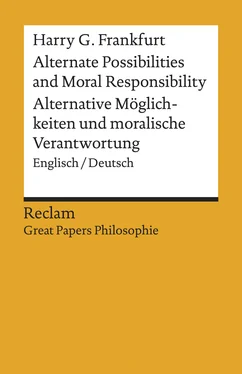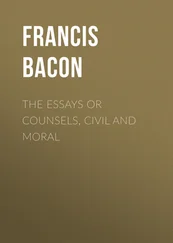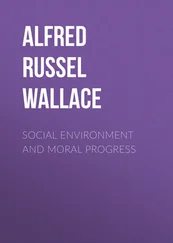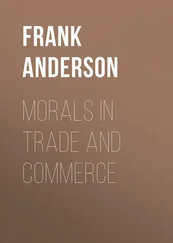It is generally agreed that a person who has been coerced to do something did not do it freely and is not morally responsible for having done it. Now the doctrine that coercion and moral responsibility are mutually exclusive may appear to be no more than a somewhat particularized version of the principle of alternate possibilities. It is natural enough to say of a person who has been coerced to do something that he could not have done otherwise. And it may easily seem that being coerced deprives a person of freedom and of moral responsibility simply because it is a special case of [831] being unable to do otherwise. The principle of alternate possibilities may in this way derive some credibility from its association with the very plausible proposition that moral responsibility is excluded by coercion.
It is not right, however, that it should do so. The fact that a person was coerced to act as he did may entail both that he could not have done otherwise and that he bears no moral [12]
responsibility for his action. But his lack of moral responsibility is not entailed by his having been unable to do otherwise. The doctrine that coercion excludes moral responsibility is not correctly understood, in other words, as a particularized version of the principle of alternate possibilities.
Let us suppose that someone is threatened convincingly with a penalty he finds unacceptable and that he then does what is required of him by the issuer of the threat. We can imagine details that would make it reasonable for us to think that the person was coerced to perform the action in question, that he could not have done otherwise, and that he bears no moral responsibility for having done what he did. But just what is it about situations of this kind that warrants the judgment that the threatened person is not morally responsible for his act?
This question may be approached by considering situations of the following kind. Jones decides for reasons of his own to do something, then someone threatens him with a very harsh penalty (so harsh that any reasonable person would submit to the threat) unless he does precisely that, and Jones does it. Will we hold Jones morally responsible for what he has done? I think this will depend on the roles we think were played, in leading him to act, by his original decision and by the threat.
One possibility is that Jones 1is not a reasonable man: he [14]is, rather, a man who does what he has once decided to do no matter what happens next and no matter what the cost. In that case, the threat actually exerted no effective force upon him. He acted without any regard to it, very much as if he were not aware that it had been made. If this is indeed the way it was, the situation did not involve coercion at all. The threat did not lead Jones 1to do what he did. Nor was it in fact sufficient to have prevented him from doing otherwise: if his earlier decision had been to do something else, the threat would not have deterred him in the slightest. It seems evident that in these circumstances the fact that Jones 1was threatened in no way reduces the moral responsibility he would otherwise bear for his act. This example, however, is not a counterexample either [832] to the doctrine that coercion excuses or to the principle of alternate possibilities. For we have supposed that Jones 1is a man upon whom the threat had no coercive effect and, hence, that it did not actually deprive him of alternatives to doing what he did.
Another possibility is that Jones 2was stampeded by the threat. Given that threat, he would have performed that action regardless of what decision he had already made. The threat upset him so profoundly, moreover, that he completely forgot his own earlier decision and did what was demanded of him entirely because he was terrified of the penalty with which he was threatened. In this case, it is not relevant to his having performed the action that he had already decided on his own to perform it. When the chips [16]were down he thought of nothing but the threat, and fear alone led him to act. The fact that at an earlier time Jones 2had decided for his own reasons to act in just that way may be relevant to an evaluation of his character; he may bear full moral responsibility for having made that decision. But he can hardly be said to be morally responsible for his action. For he performed the action simply as a result of the coercion to which he was subjected. His earlier decision played no role in bringing it about that he did what he did, and it would therefore be gratuitous to assign it a role in the moral evaluation of his action.
Now consider a third possibility. Jones 3was neither stampeded by the threat nor indifferent to it. The threat impressed him, as it would impress any reasonable man, and he would have submitted to it wholeheartedly if he had not already made a decision that coincided with the one demanded of him. In fact, however, he performed the action in question on the basis of the decision he had made before the threat was issued. When he acted, he was not actually motivated by the threat but solely by the considerations that had originally commended the action to him. It was not the threat that led him to act, though it would have done so if he had not already provided himself with a sufficient motive for performing the action in question.
No doubt it will be very difficult for anyone to know, in a [18]case like this one, exactly what happened. Did Jones 3perform the action because of the threat, or were his reasons for acting simply those which had already persuaded him to do so? Or did he act on the basis of two motives, each of which was sufficient for his action? It is not impossible, however, that the situation should be clearer than situations of this kind usually are. And suppose it is apparent to us that Jones 3acted on the basis of his own decision and not be-[833]cause of the threat. Then I think we would be justified in regarding his moral responsibility for what he did unaffected by the threat even though, since he would in any case have submitted to the threat, he could not have avoided doing what he did. It would be entirely reasonable for us to make the same judgment concerning his moral responsibility that we would have made if we had not known of the threat. For the threat did not in fact influence his performance of the action. He did what he did just as if the threat had not been made at all.
The case of Jones 3may appear at first glance to combine coercion and moral responsibility, and thus to provide a counterexample to the doctrine that coercion excuses. It is not really so certain that it does so, however, because it is unclear whether the example constitutes a genuine instance of coercion. Can we say of Jones 3that he was coerced to do something, when he had already decided on his own [20]to do it and when he did it entirely on the basis of that decision? Or would it be more correct to say that Jones 3was not coerced to do what he did, even though he himself recognized that there was an irresistible force at work in virtue of which he had to do it? My own linguistic intuitions lead me toward the second alternative, but they are somewhat equivocal. Perhaps we can say either of these things, or perhaps we must add a qualifying explanation to whichever of them we say.
This murkiness, however, does not interfere with our drawing an important moral from an examination of the example. Suppose we decide to say that Jones 3was not coerced. Our basis for saying this will clearly be that it is incorrect to regard a man as being coerced to do something unless he does it because of the coercive force exerted against him. The fact that an irresistible threat is made will not, then, entail that the person who receives it is coerced to do what he does. It will also be necessary that the threat is what actually accounts for his doing it. On the other hand, suppose we decide to say that Jones 3 was coerced. Then we will be bound to admit that being coerced does not exclude being morally responsible. And we will also surely be led to the view that coercion affects the judgment of a person’s moral responsibility only when the person acts as he does because he is coerced to do so – i.e., when the fact that he is coerced is what accounts for his action.
Читать дальше












